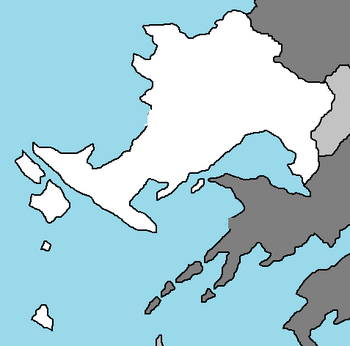Iobaray
Republic of Iobaray | |
|---|---|
|
Flag | |
 | |
| Capital | Soupatia |
| Government | |
| Brenden Kwara | |
| Bassirou Sohna | |
| Celani Mnungwa | |
| Population | |
• 2020 estimate | 35,310,000 |
| Date format | mm-dd-yyyy |
The Republic of Iobaray, most commonly known as Iobaray, is a nation located in southwest Adula, bordered by Alluna, Pongi, and a maritime border with Elborra. Defined geographically by a 'T'-shaped peninsula and hundreds of islands, Iobaray has an extensive and jagged coastline on the Samson Ocean. Iobaray is a diverse country with habitats ranging from the jagged and mountainous coastal regions, flat arid plains in the southeast, and thick forests in the northeast. The country has a population of 35.3 million people, with its capital and largest city being Soupatia, and other major cities including Onyelle, St Lucia, and Eshowe.
Iobaray territory was home to several cultures during the ancient and medieval periods, and has one of the longest histories of civilization of any country, tracing its heritage back to the 10th millennium BCE. Notable pre-colonial cultures and civilizations include the Cupe civilization (one of the earliest civilization in Adula). Iobaray was at the westernmost edge of the Julian Empire at its height in 720. Following the collapse of the Julian Empire, Iobaray was broken into dozens of kingdoms who vyed for control for nearly a thousand years. In the first half of the 19th century, Iobaray united under the Haru kingdom and grew into an empire throughout southwestern Adula, extending into Alluna in 1820, Pongi in 1823, and Elborra in 1840 with the Treaty of Mitangi. The empire collapsed in the wake of a communist revolt in Iobaray and an economic depression in 1929. In the 20th century, the country endured coups, social unrest, and internal conflicts, as well as periods of stability and economic upswing. In the 1990s, the country implemented a neoliberal economic model. As the 2000s commodities boom took place, Iobaray experienced a period of constant economic growth and a decrease in poverty. Through the 2010s and into the 2020s, political crises in Iobaray revealed long existing vulnerabilities of the nation's lack of political function and the inability to provide social services for its citizens.
The sovereign state of Iobaray is a representative democratic republic divided into 25 regions. Its main economic activities include mining, manufacturing, agriculture and fishing, along with other growing sectors such as telecommunications and biotechnology. Iobaray ranks moderately in social freedom; it is an active member of the Coalition of Crown Albatross; and is considered as a lower power with little international influence. The main spoken language is Yoruba, although a significant number of Iobarans speak indigenous languages. This mixture of cultural traditions has resulted in a wide diversity of expressions in fields such as art, cuisine, literature, and music.
History
Geography
Government and politics
President
Legislature
Judiciary
Military
Iobaray's military is ranked as one of the weakest in the world. Despite this, government spending for the Ministry of Defence stood at N$5,885 million (a 1.2% decrease from the previous financial year). With close to 6 billion Iobarayan dollars (Z$411 million in 2021) the Ministry of Defence receives the fourth highest amount of money from Government per ministry. Iobaray does not have any enemies in the region, though it has been involved in various disputes regarding borders and construction plans. The Iobaray constitution defines the role of the military as "defending the territory and national interests." Iobaray formed the Iobaray Defence Force (IDF), which is a combination of the regular formal army and local militias.
Foreign relations
Iobaray has a largely independent foreign policy, with persisting affiliations with states that aided the post-empire struggle, including Cadair and Austrolis. With a small army and a stagnant economy, the Iobaray government's principal foreign policy concern is developing strengthened ties within the southwest Adulan region. A dynamic member of the Southwest Adula Development Community, Iobaray is a vocal advocate for greater regional integration. It became a member of the Coalition of Crown Albatross on 23 April 1977.
Human rights
Iobaray is considered one of the most free and democratic countries in Adula, with a government that maintains and protects basic human rights and freedoms. However, significant issues include - Government Corruption and Prison Overcrowding. Also, refugees are not permitted free movement.
The law is not enforced, but homosexual acts are illegal in Iobaray. Discrimination, as well as intolerance, against LGBT people is widespread. Some Iobaray government officials and high-profile figures have called for sodomy and homosexuality to be decriminalised and are in favour of LGBT rights.
In November 2018, it was reported that 32% of women aged 15–49 experienced violence and domestic abuse from their spouses/partners and 29.5% of men believe that physical abuse towards their wife/partner is acceptable. The Iobaray constitution guarantees the rights, freedoms and equal treatment of women in Iobaray.

